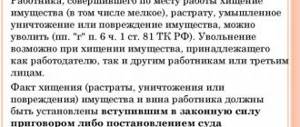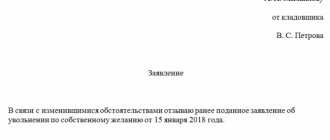Clause 1 of Art. 15 of the Civil Code of the Russian Federation establishes that a person whose right has been violated may demand full compensation for the losses caused to him, unless the law or contract provides for compensation for losses in a smaller amount. By damages, the legislator understands the expenses that a person whose right has been violated has made or will have to make to restore the violated right, as well as loss or damage to his property (real damage), as well as lost income that this person would have received under normal conditions of civil circulation , if his right had not been violated (lost profits).
The basis for satisfying a claim for compensation for damages is a set of conditions: the fact of causing harm, the illegality of the actions of the harm-doer, the amount of harm caused and the cause-and-effect relationship between the fact of causing harm and the unlawful actions.
By virtue of the provisions of Art. 393 of the Civil Code of the Russian Federation, losses caused by non-fulfillment or improper fulfillment of an obligation are subject to compensation.
Let's consider how these provisions of the law are applied when resolving disputes in which organizations in the construction industry are participants.
What expenses will the developer not be able to recover from the contractor?
Situation 1. The shareholder sent a claim to the developer to correct construction defects in the apartment transferred under the share participation agreement.
Since the developer ignored the claim, the shareholder went to court. By a court decision, the developer was charged with material damage in the amount of 25 thousand rubles caused in connection with the elimination of defects in the apartment, compensation for moral damage in the amount of 10 thousand rubles, a fine in the amount of 17.5 thousand rubles, and the cost of conducting an assessment in the amount of 5 thousand rubles, state duties in the amount of 1.8 thousand rubles. The developer first turned to the general contractor and then to the court to claim compensation for losses. At the same time, the developer referred to a clause in the contract, according to which the general contractor is obliged to eliminate at his own expense defects discovered during the five-year warranty period.
The arbitrators recalled that a person demanding compensation for losses must prove the fact of their infliction and the amount, improper fulfillment of contractual obligations, as well as the existence of a cause-and-effect relationship between the losses incurred and the actions of the person through whose fault they arose. There is no cause-and-effect relationship between the unlawful actions of the general contractor (poor quality of construction work) and the developer’s expenses in terms of payment of a fine to the participant, reimbursement of expenses for conducting an examination and state duty. The fact is that the developer, by virtue of the provisions of the Law of the Russian Federation of 02/07/1992 No. 2300-1 “On the Protection of Consumer Rights,” was obliged to take measures to resolve the dispute and compensate the citizen for losses without bringing the dispute to trial. Bringing a dispute against an injured citizen on the part of the developer to consideration in court and reimbursement to the shareholder of expenses associated with the consideration of the case by a court of general jurisdiction cannot be qualified as losses. By virtue of clause 6 of Art. 13 of the said law, a fine in the amount of 50% of the amount awarded by the court in favor of the consumer is collected by the court only in the event of failure to voluntarily satisfy the consumer’s requirements. Accordingly, such a requirement was subject to satisfaction by the developer and is his business risk, and therefore cannot be attributed to losses caused by the general contractor. As a result of the latter, they were obliged to compensate the developer only for material damage in the amount of 25 thousand rubles that arose in connection with the elimination of construction defects (Resolution of the AS VSO dated 06/04/2015 in case No. A58-5728/2014).
Situation 2. The developer and the general contractor, having entered into a general contract for the construction of a residential building, agreed that the developer would finance the purchase of a tower crane for the construction by transferring funds to the general contractor’s bank account. In this case, the delivery, installation and installation of the crane on site, and its maintenance during the work are paid for by the general contractor who acquires ownership of the crane. The following was also agreed:
- the advance amount transferred to the general contractor for the purchase of the crane is withheld by the developer from the cost of the work performed by the general contractor;
- the general contractor compensates the developer for the costs of paying bank interest accrued on the amount of the advance payment provided for the purchase of the crane by deducting the compensation amounts from the cost of the work performed;
- If the parties terminate the contract, the general contractor returns the balance of funds received for the purchase of the crane.
The developer took out a loan from the bank and transferred money to the general contractor to purchase the crane.
Subsequently, by agreement of the parties, the general contract agreement was terminated. Due to the failure to repay the debt for the crane, the developer demanded a debt in the amount of 8.5 million rubles. judicially.
Then the developer filed a new lawsuit in court, demanding to oblige the general contractor to compensate for losses associated with the payment of interest to the bank under the loan agreement. However, the developer was denied this request. The court rejected the developer's argument that the obligation to pay interest arose through the fault of the general contractor, who did not provide the construction of the facility with the necessary equipment (crane). The arbitrators pointed out: the developer’s assumption of loan obligations to the bank was not necessary, was due to the decision of the developer himself and was not related to the illegal actions of the general contractor. Therefore, there is no reason to attribute the costs of repaying interest on the loan to the latter (Resolution of the AS Far Eastern Military District dated January 28, 2015 No. F03-5901/2014).
Grounds for recovery of losses from LLCs and companies with other forms of ownership
Protecting the interests of legal entities by collecting damages in court or through peaceful negotiations is a universal option for liability in civil law. Such a measure can be applied both in case of violation of obligations within the framework of a specific transaction, and if it is necessary to compensate for damage in the absence of an agreement.
A civil offense is a basis for compensation for losses incurred, which arises under certain conditions. These include the following:
- illegality, that is, violation of the provisions of civil law, as well as a contract, if any;
- the occurrence of negative consequences, which are considered losses or harm, regardless of their type;
- a causal connection between the offense committed and the consequences, which are considered losses if they arose directly due to the unlawful act;
- guilt, that is, the psychological and psychiatric aspect, which determines that the person who violated civil law was aware of what he was doing and wanted the corresponding negative consequences to occur.
To recover damages, you will need to establish each of the above conditions. If at least one of them is not proven, the court may reject the claim.
Moreover, the damage may be reassessed. Often in practice, the court makes a decision in favor of the injured party, but with a significant reduction in the amount of recovery, which is also explained by the absence of any sign.
In some cases, compliance with one of the conditions, namely the establishment of guilt, is not required. The Civil Code of the Russian Federation explains that this sign is characterized by the absence of objective measures on the part of the offender aimed at eliminating the harm (clause 1 of Article 401 of the Civil Code of the Russian Federation).
In practice, recovery of damages does not require proof of guilt, since it is presumed, that is, assumed a priori.
When does illegal logging not entail the obligation to compensate for damage to forests?
The environmental agency established that the subcontractor organization, before receiving all the documents necessary for felling, including the conclusion of the state examination of the forest development project and filing a forest declaration, carried out felling of forest plantings on a land plot leased for the construction of a linear facility.
It turned out that the customer of the work and the general contractor did not give the subcontractor instructions to begin cutting down the trees. The offender was fined under Part 1 of Art. 8.28 of the Code of Administrative Offenses of the Russian Federation in the amount of 50 thousand rubles, which was paid by the subcontractor. In addition, the controllers went to court with a demand to recover from the organization the damage caused to forests due to violation of forest legislation in the amount of 3,891 thousand rubles.
The arbitrators found that when carrying out work on the construction of a linear facility, clear cuttings were provided in order to free up the land. At the time of consideration of the case, the authorized body approved the conclusions of the state examination of forest development projects, forest declarations were submitted. The fact that these actions were carried out after felling indicates that the felling was carried out before proper documentation and permission, but does not prove that the forests suffered exactly the damage for which the environmental service went to court. The fact is that the construction of a linear facility objectively presupposes and requires the performance of exactly those actions that were performed by the subcontractor. Thus, in the case under consideration, there was no damage to the forests, which would have occurred in the absence of all permitting documentation in the future. Under such circumstances, the court rejected the inspectors’ argument that the presence of an established fact of illegal logging is a sufficient basis for compensation for damage (Determination of the Supreme Court of the Russian Federation of September 28, 2015 No. 309-ES15-12040 in case No. A60-47861/2014).
Evidence base for recovery of damages
If the fact of causing damage has been identified and the amount of damages has been calculated, then measures must be taken to recover them. Before filing a claim or trying to reach an amicable agreement, it is necessary to identify the subject of proof.
Several circumstances are identified that require establishment within the framework of judicial or pre-trial proceedings in a case for compensation for losses caused.
These include the following:
- the occurrence of grounds allowing a claim for damages to be made (failure to fulfill obligations under a specific agreement);
- establishing a cause-and-effect relationship, as well as proving the inevitability of losses, which is the most difficult thing in this process (violation of the terms of the contract as a cause, loss of funds by the counterparty as a consequence);
- an objective assessment of the consequences of violating the interests of a legal entity, in this case this is a detailed and reasonable calculation of losses;
- the effect of the presumption of guilt, which in civil proceedings presupposes the guilt of the offender until the contrary is proven;
- determination of measures taken to prevent damage, that is, an assessment of the actions of the offender and his conscientiousness is necessary;
- evidence of actions aimed at obtaining benefits that were lost as a result of the violation (the legal entity received a license to carry out a specific type of activity, purchased equipment, premises, but because of the counterparty missed the opportunity to engage in it).
The more circumstances of the case are proven, the easier it will be to recover damages. As practice shows, the existence of an agreement and calculation of damages is not enough to satisfy a claim.
Although the burden of proving his own innocence lies with the defendant, the applicant must also take care of the basis of his claims at the stage of filing documents.
Recovery of damages based on a statement of claim - how to file a claim?
A statement of claim for the recovery of damages from a legal entity provides for a full reflection of the circumstances in which a violation of the rights and interests of a party to the agreement occurred.
The principle of drawing up a document is no different from the claim procedure. However, in case of non-compliance with the requirements established by Art. 131 of the Civil Code of the Russian Federation, the claim may remain without consideration, without movement, or may be returned to the applicant.
To draw up an application correctly, it is enough to follow a number of simple rules. The claim always has a written form. The circumstances and requirements are presented in a free version. The main thing is to include the necessary information in the document, which includes the following:
- full name of the judicial authority to which the application is sent;
- name of the plaintiff organization, full name of its director, TIN, legal address, contacts;
- information about the defendant indicating all the necessary information for sending court rulings and identifying the party to the dispute (name, address, contacts);
- circumstances of the case, chronology of events, starting from the moment the contract was concluded (including verbally) and ending with the filing of a claim demanding compensation for damage;
- evidence confirming the emergence of legal relations, as well as the fact of violation of the interests of the plaintiff;
- reference to the calculation of losses, as well as other documents submitted in addition to the application;
- reference to legal provisions that allow you to claim compensation for damages in court;
- the plaintiff’s demand to recover the calculated amount of damage from the defendant;
- annex with a complete list of additional documents.
The claim ends with the personal signature of the plaintiff or his representative by proxy, as well as the date of drawing up the document. The period for its consideration and acceptance (rejection) is counted from the moment the application is received by the court.
It is important to remember that any violations in the preparation of the application may lead to refusal to accept it. The court has the right to leave the claim without progress (Article 136 of the Arbitration Procedure Code of the Russian Federation), which provides for the elimination of shortcomings within the period established by the presiding judge, otherwise the documents will be returned.
Also, if certain circumstances exist, the application remains without consideration. This is possible when the case on this subject of the claim is already being considered by an arbitration or arbitration court, as well as in case of non-compliance with the claim procedure, absence of the plaintiff’s signature, and so on (Article 148 of the Arbitration Procedure Code of the Russian Federation).








